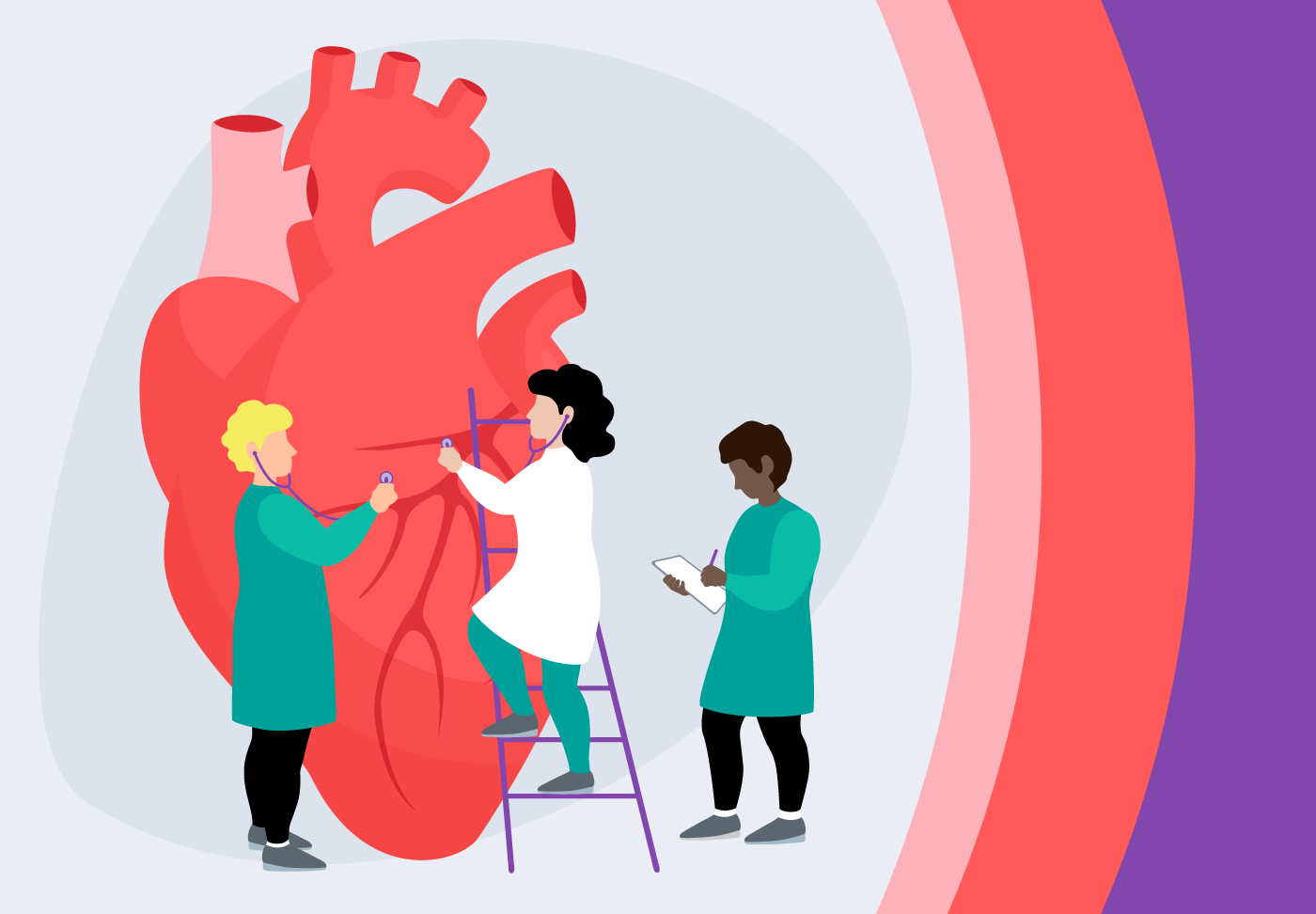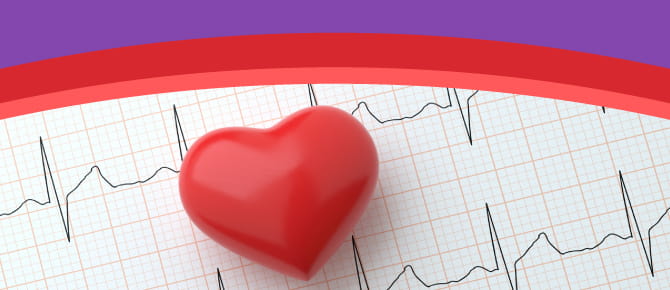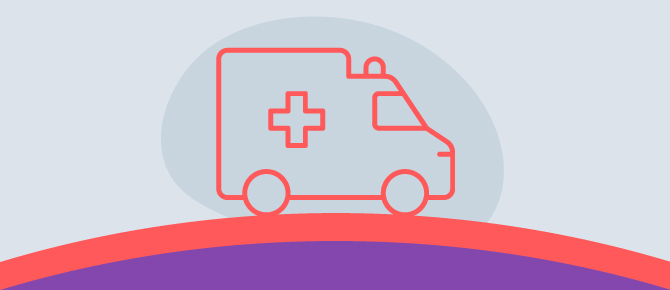Congestive Heart Failure
Congestive Heart Failure Overview
Congestive heart failure, or heart failure, describes a condition in which the weakened or stiff heart cannot pump enough blood to the rest of the body or with enough force to supply the body’s needs. As a consequence, the heart fails to take blood from the lungs, oxygenate it, and send it to the tissues depending on oxygen-rich blood for their metabolism. The term "heart failure" does not mean that your heart has stopped and should not be confused with a heart attack or cardiac arrest. However, heart failure is a serious condition that requires medical attention.Heart failure is a chronic, long-term condition that can affect either the right or left side of the heart — the ventricles — but most commonly affects the left side first. Failure is present when:
- Your heart muscle cannot pump, or eject, the blood out of the heart efficiently. This is called systolic heart failure.
- Heart failure can also occur when your heart muscle is stiff and does not easily fill up with blood. This is called diastolic heart failure.
When the heart’s pumping action decreases, blood may back up in other parts of the body, causing fluid to build up in the lungs, the liver, the gastrointestinal tract and the arms and legs. Swelling, or edema, can result, most commonly in the legs and ankles. Heart failure may also affect your kidneys and lower their ability to dispose of sodium and water, thus leading to more swelling.
The most common cause of heart failure is believed to be coronary heart disease — or coronary artery disease — a narrowing of the small blood vessels that supply oxygenated blood to the heart. Failure can result when an infection weakens heart muscles, a disorder called cardiomyopathy.
Other problems that may lead to heart failure include:
- Congenital heart disease
- Heart attack
- Heart valve disease
- Some types of abnormal heart rhythms (arrhythmias)
- High blood pressure
- Diseases such as emphysema, diabetes, severe anemia or hyperthyroidism
Symptoms of congestive heart failure
Many patients do not exhibit symptoms in the early stages of congestive heart failure. But when symptoms do develop, they most often begin slowly, a sign of a chronic or ongoing condition. Sometimes, it may be an acute condition, meaning that it starts suddenly after a heart attack or other heart-related problem. Chronic heart failure symptoms include:
- Shortness of breath (dyspnea) with activity or when you lie down
- Fatigue, faintness and weakness
- Swelling (edema) of feet and ankles
- Bloating in the abdomen (ascites)
- Rapid or irregular heartbeat or pulse
- Persistent cough or wheezing with white or pink blood-tinged sputum
- Weight gain due to fluid retention
- Loss of appetite or indigestion
Symptoms of acute heart failure
Acute heart failure symptoms are similar to those of chronic heart failure, but are more pronounced or may start and worsen suddenly. These symptoms may also include:
- More pronounced pulsing of heartbeat (palpitations)
- Sudden fluid buildup
- Sudden, severe shortness of breath
- Chest pain, if your heart failure is caused by a heart attack
Some patients with heart failure only exhibit symptoms — particularly chest pains — in conjunction with other severe conditions such as an abnormal heart rhythm (arrhythmias), angina, myocardial infarction, anemia, hyperthyroidism, infections with high fever or kidney disease.
Risk factors
A single risk factor may be enough to cause heart failure, but a combination of factors increases your risk. Such factors include:
- Persistent uncontrolled high blood pressure
- Coronary artery disease
- Heart attack
- Sustained arrhythmia
- Diabetes and some related medications
- Sleep apnea
- Congenital heart defects
- Viruses
- Excessive alcohol use
- Kidney issues
Congestive Heart Failure Prevention
The key to preventing congestive heart failure is to reduce your risk factors that can lead to heart failure. Several of the risk factors — for example, high blood pressure, high cholesterol or coronary artery disease — can be controlled and possibly eliminated through lifestyle changes and medications.Reduce your risk
You can lower your chances of congestive heart failure through several methods:
- Maintain a healthy weight.
- Don’t smoke.
- Don’t drink alcohol in excess.
- Eat healthy foods and reduce sodium intake.
- Exercise as recommended by your Wellstar physician.
- Control certain physical conditions, including high blood pressure, cholesterol and diabetes.
- Reduce and manage stress.
Tests & screenings
The symptoms of congestive heart failure can be confused with symptoms of other diseases that affect breathing, including bronchitis, pneumonia, emphysema and asthma. In diagnosing for congestive heart failure, your Wellstar physician will take a careful medical history and perform a physical examination. The physical examination can determine if you have fluid within or around the lungs (pleural effusion), an irregular heartbeat, fluid build-up in your legs or abdomen, distended veins in your neck or abnormal sounds in your heart or lungs.Based on the exam, your physician might order some of these tests:
- Chest X-ray to reveal fluid build-up in the lungs and possible enlargement of the heart.
- Blood tests to check your kidney and metabolic functions or for diseases that could affect the performance of your heart.
- Electrocardiogram (ECG) to record the electrical activity of your heart and to reveal if there are rhythmic issues or if there had been a heart attack.
- Echocardiogram, an ultrasound test, designed to show the pumping and filling of your heart, a measurement known as the ejection fraction. In a healthy heart, the ejection fraction is about 55%.
- Multiple-Gated Acquisition Scanning (MUGA) in which a mild radioactive dye is injected into a vein so that it may travel to the heart where scans can better detail the performance of the heart.
- Cardiac Stress Tests which measure your heart’s performance during exertion.
- Cardiac Computerized Tomography (CT) Scan or Magnetic Resonance Imaging (MRI).
- Cardiac Catheterization or angiogram in which a thin, flexible tube (catheter) is inserted into your groin or arm and guided through the aorta into your heart. Dye is injected through the tube so that the arteries and pumping chamber (left ventricle) are outlined.
Congestive Heart Failure Diagnosis
If screening tests or check-ups reveal abnormal results, your Wellstar physician will perform further evaluations regarding congestive heart failure.
- Blood tests
- Electrocardiogram (ECG or EKG)
- Echocardiography
- Magnetic Resonance Imaging (MRI)
- Computed Tomography (CT) scan
- Chest X-rays
- Multiple-Gated Acquisition Scanning (MUGA)
- Cardiac stress tests
- Cardiac catheterization or angiogram
Congestive Heart Failure Treatment
Currently, heart failure has no cure. It is a chronic condition that needs lifelong attention. But through a combination of self-monitoring, lifestyle changes, medication, surgery, heart pumps and—in extreme cases—heart transplants, people with heart failure and advanced heart failure can live longer and more active lives.Clinical trials
The Wellstar Research Institute works closely with our team and select national partners to offer cardiac clinical trials. We participate in more than 20 cardiac-related clinical research studies at a given time, giving our patients access to advanced treatments close to home. For more information about clinical trials, please talk with your heart failure specialist at Wellstar.
Lifestyle changes and at-home care
Making lifestyle changes can help relieve the symptoms of heart failure and prevent it from worsening. The most beneficial changes include:
- Stopping smoking and limiting alcohol consumption
- Restricting sodium intake
- Weighing yourself daily to keep track of fluid retention
- Maintaining a healthy weight and diet
- Exercising and reducing stress
- Elevating feet and legs if they become swollen
Medication for heart failure
Your Wellstar heart failure specialist may prescribe a combination of medications if you have been diagnosed with congestive heart failure. Some of these medicines include:
- Angiotensin-converting enzyme (ACE) inhibitors. These medications help ease pressure on blood vessels by blocking the formation of natural chemicals that narrow the vessels, thus decreasing the workload on the heart. Examples include enalapril (Vasotec®), lisinopril (Prinivil®, Zestril®) and captopril (Capoten®).
- Angiotensin II receptor blockers. These medications help relax blood vessels by blocking the action — not the formation — of natural chemicals that narrow vessels. These include losartan (Cozaar®) and valsartan (Diovan®).
- Beta blockers. Usually combined with a diuretic, these medications reduce the heart’s workload and expand blood vessels, thus causing your heart to work slower with less force. These may include carvedilol (Coreg®), metoprolol (Lopressor®) and bisoprolol (Zebeta®).
- Digoxin (Lanoxin®). This medication, also known as digitalis, increases the strength of your heart muscle contractions but tends to slow the heartbeat.
- Diuretics. Sometimes called “water pills,” these medications work on your kidneys to help your body eliminate sodium and water, thus reducing blood volume. Diuretics most often prescribed for heart failure include bumetanide (Bumex®) and furosemide (Lasix®). Because diuretics also cause you to eliminate essential minerals such as potassium and magnesium, your Wellstar physician may also prescribe supplements or an aldosterone antagonist, a diuretic that maintains potassium levels.
- Aldosterone antagonists (spironolactone (Aldactone®, Carospir®) and eplerenone (Inspra®). These potassium-sparing diuretics have additional properties to help people with severe systolic heart failure live longer.
- Positive inotropes. Also known as heart pump medication, inotropic medication is for people with advanced heart failure. Inotropes are delivered through an IV to strengthen the heart’s pumping action.
- Hydralazine and isosorbide dinitrate (BiDil). In combination, these drugs help relax blood vessels for people with severe heart failure symptoms who have not benefitted from ACE inhibitors or beta blockers.
- Vericiguat (Verquvo). For people with high-risk heart failure, this oral drug decreases is the risk for hospital stays and heart disease-related death.
- Other medications.
Surgery for heart failure
In some cases, your Wellstar physician may recommend cardiovascular surgery or medical devices to treat the problems that have led to congestive heart failure. Such treatments include:
- Coronary bypass surgery. If your doctor determines that severely blocked arteries have contributed to your heart failure, they may recommend this procedure in which a vein from your leg, or artery from your arm or chest, replaces a blocked artery in your heart to allow the blood to flow more freely.
- Angioplasty. An alternative to coronary bypass surgery, angioplasty involves threading a catheter through your blood vessels to the affected artery and expanding a balloon or stent to push aside cholesterol deposits so that blood may flow more easily.
- Heart valve repair or replacement. If a faulty heart valve causes your heart failure, your Wellstar Cardiologist may modify the valve (valvuloplasty) to eliminate backward blood flow, repair the valve such as tightening or replacing the ring around the valve (annuloplasty), or replace it with an artificial or prosthetic valve.
- Implantable cardioverter-defibrillators (ICDs). An ICD is a heart-monitoring device implanted under your skin and attached to your heart with small wires. If your heart rhythm is dangerously irregular, the ICD shocks the heart back into its normal rhythm.
- Cardiac resynchronization therapy (CRT) or biventricular pacing. Pacemakers are devices that control the rhythm of your heart. Implanted by a Wellstar cardiologist specializing in electrical disorders, the pacemakers send timed electrical impulses to both of the heart’s lower chambers (the right and left ventricles) to ensure that your heart pumps in an efficient and coordinated manner.
- Optimizer Smart Mini.
- Heart pumps. Also known as left ventricular assist devices or LVADs, these devices are implanted into the abdomen or chest and attached to a weakened heart to aid it in pumping.
- Heart transplant. When other surgical procedures and treatments fail to maintain the affected heart, a transplant to replace the heart with a healthy donor heart may be the only option.
Support for Congestive Heart Failure
Wellstar’s heart failure team is dedicated to helping people manage heart failure so they can create and maintain healthy lifestyles. Our comprehensive care teams are made up:
- Physicians and surgeons who specialize in managing heart failure through medication and surgery
- Nurse practitioners
- Nurses
- Social workers
- Pharmacists
- Physical therapists, exercise physiologists and occupational therapists
- Dietitians
- Psychologists and counselors
In addition to seeing your primary heart failure specialist on a regular basis for medical treatment, Wellstar also offers several support services to help manage heart failure over time, including:
- Heart failure support groups
- Heart failure clinics
- Cardiac rehabilitation
- Cardiovascular behavioral health
Support group
Our Turning Heart Failure into Heart Function Support Group is for patients with heart failure and their families and personal support team members. Learn from Wellstar’s heart failure team and connect with your peers. Each session will cover new topics like nutrition and medication.This in-person group meets monthly, rotating between select Wellstar medical center locations. New locations coming soon. To learn more about the time and location of our next meeting register by email or call (770) 956-STAR (7827).
Heart failure clinics
People with heart failure can have the energy they need to feel good and enjoy life. Our multidisciplinary heart failure teams offer people comprehensive support to manage their condition and limit visits to the hospital. A person’s team may include a cardiologist, advanced practice provider, nurse, social worker, pharmacist, or others.Learn more about Wellstar’s heart failure clinics.
Cardiac rehabilitation
Starting an exercise program and making other changes may seem intimidating, or even frightening to someone who has had a heart attack or heart procedure. Cardiac rehabilitation provides a safe and secure environment to inspire long-term heart health and confidence.Learn more about cardiac rehabilitation at Wellstar.
Cardiac behavioral health
Our cardiovascular behavioral medicine team empowers people with heart conditions to achieve their health goals, manage emotions related to their condition and help avoid rehospitalization. Sometimes low mood, panic, overwhelming emotions, difficulties with problem-solving or memory, frustration with making change, and chronic fatigue get in the way of progress. If you have a cardiac condition, have made a good-faith effort at change and are still struggling to achieve health goal success, a referral to one of our clinicians could help. We offer in-person and virtual appointments depending on your preference and clinical needs.Learn more about cardiovascular behavioral health at Wellstar.






